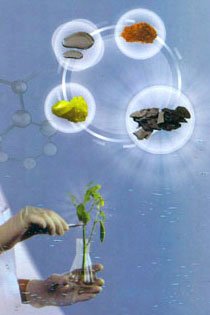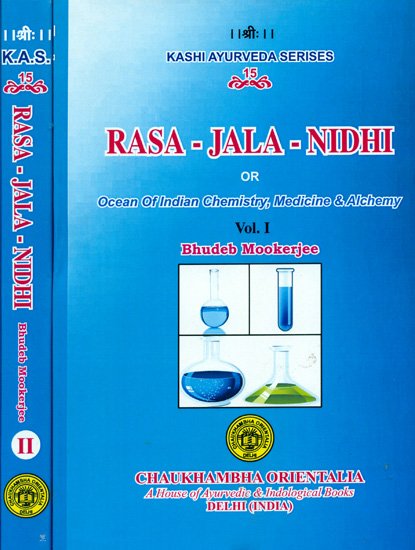Rasa Jala Nidhi, vol 5: Treatment of various afflictions
by Bhudeb Mookerjee | 1938 | 63,627 words | ISBN-10: 8170305829 | ISBN-13: 9788170305828
This fifth volume of the Rasa-jala-nidhi deals with the symptoms, treatment and dietary prescriptions of various afflictions. For example, ratapitta (haemoptysis), cough, asthma, tumours and obesity are dealth with and various Iatro-chemical recipes are provided for these diseases. The Rasa-jala-nidhi (“the ocean of Iatrochemistry, or, chemical me...
Chapter 6 - Diseases affecting the heart (hridroga)
Diseases affecting the heart (hridroga).
These are due to (a) eating or drinking in excess of articles which are very hot, or heavy or hitter or astringent in taste, (b) hard labour; (c) physical shock, especially received in the region of the heart; (d) taking a fresh meal before the preceding one is digested; (e) worries and mental strain; (f) and suppression of calls of nature.
These diseases may be due to any one of the following causes, and are, therefore, of five different kinds:—(a) abnormal excess of vayu, (b) ditto of pitta (c) ditto of kapha, (d) ditto of the three combined, and (e) worms.
In all of these diseases, the chyle is vitiated by any one or all of the three dosas and give rise to troubles in the heart (hridroga).
Symptoms of heart disease due to vayu:—
The heart appears occasionally or constantly to be dragged along, or hammered, or churned, or cut asunder, or pricked, or torn asunder, as it were, by some other thing.
Symptoms of heart disease due to pitta:—
Thirst, heating sensation, inflammation, sensation of being licked by some other thing and of depression felt in the heart, appearance of smoko rising out of the throat, occasional loss of consciousness, perspiration, and dryness of the mouth.
Symptoms of heart disease due to phlegm:—
Heaviness of the heart, expectoration of phlegm, aversion to food, physical numbness, dull-ness of the digesting heat, and taste of sweetness felt in the mouth.
Symptoms of heart diseases due to the combination of the three dosas:—
Symptoms of heart diseases due to the combination of the three dosas are the combination of all the symptoms enumerated above.
Causes and symptoms of heart disease due to worms:—
If a patient who is already suffering from heart disease, due to an abnormal excess of the three dosas, takes such unwholesome food as sesamum seeds, milk mixed with molasses, etc., a kind of knot or tumour grows somewhere in his heart, which lets out putrefied chyle in which grow worms.
Vomiting, spitting, pricking sensation, pain, hiccough, occasional feeling of darkness even in day light, aversion to food, blackish red colour of the eyes, and swelling of some parts of the body—are the symptoms of this disease.
General symptoms of heart diseases:—
Disagreeable sensation in that part of the body where thirst is felt i.e., in the region between the spleen and the liver,[1] vertigo, and dryness of the mouth. Symptoms which occur in worms due to phlegm may also occur in heart-diseases due to worms.
Treatment of heart disease.
Some simple remedies for heart-disease.
(1) Powdered bark of arjuna (in doses of one fourth of a tola, each), taken with an adequate quantity of clarified butter, or milk, or water dissolved with molasses, cures heart-disease, remittent fever, and raktapitta. If taken for a long time, it increases longevity.
(2) Deer’s horn, reduced to ashes by being burnt by puta, taken with clarified butter prepared from cow’s milk, puts an end to pain in the heart and the back.
(3) In heart diseases due to an abnormal excess of pitta in, it is necessary to purge the patient and apply on his breast cold unguents and to wet his body repeatedly with such juices, solutions or decoctions as have the property of pacifying pitta.
(4) Decoction, prepared from boiling, in milk, bark of arjuna and panchamuli or bala, or madhuka (mahua), and mixed with sugar, pacifies heart diseases.
(5) Decoction of barley, mixed with hingu, bacha, bira salt, shunthi, pippali, kustha, haritaki, chitraka roots, java ksara, sauvarchala salt or salt petre, and puskara roots, cures shula and heart-diseases.
Iatro-chemical treatment of heart-disease.
Partha rasa.
Equal quantities of mercury, sulphur, and mica are to be rubbed together, and subjected to bhavana, for twenty-one times, with the juice or decoction of the bark of arjuna. This medicine cures all sorts of heart-diseases, if taken with honey, in doses of six raktis, each.
Arjunabhra.
Mica, incinerated by puta for one thousand times, is to be rubbed, for seven days, with the juice or decoction of bark of arjuna, and made into pills (six raktis in weight, each), to be dried in a shady place, and taken with a few drops of honey. This medicine cures heart-diseases, all sorts of shulara, piles, hiccough, vomiting, aversion to food, diarrhoea, slowness of the digesting heat, raktapitta, waste due to ulcers, swelling due to anemia, udara-rogas, amlapitta, and chronic fever. It increases strength, and removes senile decay.
Kalyana-sundara rasa.
Equal quantities of rasa-sindura, mica, silver, gold, and cinnabar are to be rubbed together with the decoction of the roots of chitraka, and then subjected to bhavana with the juice of hastishundi, for seven times, and made into pills, one rakti in weight, each, to be taken with a little of tepid water. This medicine cures all sorts of diseases affecting the heart and the lungs, including accumulation of water in the pleura, rheumatism in the heart and lungs, and hemorrhage from them.
Chintahara rasa.
Four parts, each, of mercury, sulphur, mica, iron, tin, and bitumen; one part of gold, and two parts of silver are to be rubbed together, and subjected to bhavana, for seven times, each, with the juices or decoction of the following, in succession:—roots of chitraka, bhringaraja, and bark of arjuna. Pills are then to be made, one rakti in weight, each, to be dried in the shade, and taken with the decoction of wheat. This medicine cures all sorts of diseases affecting the heart and the lungs, spermatorrea, asthma, and cough. This is a good tonic.
Vishvadhara rasa.
One tola, each, of gold, mica, iron, tin, mercury, sulphur, and vaikranta (garnet) are to bo mixed together and subjected to bhavana with a solution of camphor (consisting of 1¾ tola of camphor and seven tolas of water), and made into pills, one rakti, in weight, each. This medicine cures all sorts of diseases affecting the heart and the lungs.
Hridayamava rasa.
Equal quantities of mercury, copper, add sulphur are to be rubbed, for one day, with the decoction of triphala, and then rubbed with the juice of kakamachi, and made into pills of the size of a chanaka gram (i.e., three raktis in weight, each). This medicine cures heart-diseases.
Virupaksa rasa.
Equal quantities of mercury and sulphur are to be rubbed together to form a black powder. This is then to be rubbed, for one day, each, with the juice or decoction of amalaki, grapes, jastimadhu, and dates. Dose, one rakti, each, to be taken with sugar and powdered amalaki.
Prabhakara vati.
Equal quantities of copper-pyrites, iron, mica, bansha-lochana, and bitumen are to be rubbed together, and subjected to bhavana with the juice or decoction of the bark of arjuna. Pills are then to be made, six raktis in weight, each, to be dried in the shade. This medicine cures all sorts of heart-diseases.
Shankara rasa.
Four parts of mercury, eight parts of sulphur, three parts of iron, and two parts of lead are to be mixed together and subjected to bhavana with the juice or decoction of each of the following, in succession:—
Kakamachi, roots of chitraka, ginger, jayanti, vasaka, bilva, and arjuna. Pills are then to be made, two raktis in weight, each, to be taken with tepid water. This medicine cures all sorts of diseases affecting the heart (hridroga) and the lungs, remittent fever, spermatorrea, cough, asthma, rheumatism, and graham. lit is a good tonic.
Deeds and diet salutary in heart-disease:—
Fomentation, purgation, vomiting, fasting, application of douche; bilepi (broken rice boiled with four times its weight of water), red shali rice of one to three years’ standing, meat and soup of birds and animals termed jangala, juice of mudga and kulattha grams, raga-saraba (soup of mudga prepared with salt, maricha, pomegranates, and grapes), khala-saraba (soup of mudga grams prepared with salt, maricha, and eight tolas of butter-milk, twenty four tolas of water, and two tolas of the following combined: ripe kapittha, leaves of changeri, maricha, jira, and roots of chitraka), kambalika-saraba (soup of mudga prepared with the water of curd, sours, salt, and maricha), bahubara fruit, patola, banana, old kusmanda, mango, pomegranates, leaves of aragbadha, green carots or radishes, castor oil, rain wster, rock-salt, grapes, butter-milk, old molasses, shunthi, jamani, garlics, haritaki, kustha, dhanya, maricha, ginger, sauvira (see page, 382, vol. III), shukta, honey, baruni, musk, red sandal, panaka (solution of molasses, sugar, or honey, and juices or extracts of fruits. Extracts of badari or parusaka fruits are especially efficacious in this case—see Sushruta, etc.), and betel leaves.
Articles of food stuff and deeds injurious in heart-diseases (hridroga):—
Suppression of calls of nature in respect of thirst, vomiting, discharge of urine, wind formed in the stomach, semen, cough, belching, respiration, stool, and tears, drinking of water of rivers issuing out of the Sahya and the vindhyas mountains, milk of rams, impure water, taking of astringents, food incongenial by combination, hot food, heavy food, bitters, sours, constant taking of pot herbs (leaf-vegetables), alkali, madhuka fruits (mahua), cleansing of teeth by means of sticks (or brushes), and letting out of blood.
Footnotes and references:
[1]:
Some texts have replaced these lines by “feeling of exertion, fatigue”.
Conclusion:
 This concludes ‘Diseases affecting the heart (hridroga)’ included in Bhudeb Mookerjee Rasa Jala Nidhi, vol 5: Initiation, Mercury and Laboratory. The text includes treatments, recipes and remedies and is categorised as Rasa Shastra: an important branch of Ayurveda that specialises in medicinal/ herbal chemistry, alchemy and mineralogy, for the purpose of prolonging and preserving life.
This concludes ‘Diseases affecting the heart (hridroga)’ included in Bhudeb Mookerjee Rasa Jala Nidhi, vol 5: Initiation, Mercury and Laboratory. The text includes treatments, recipes and remedies and is categorised as Rasa Shastra: an important branch of Ayurveda that specialises in medicinal/ herbal chemistry, alchemy and mineralogy, for the purpose of prolonging and preserving life.
